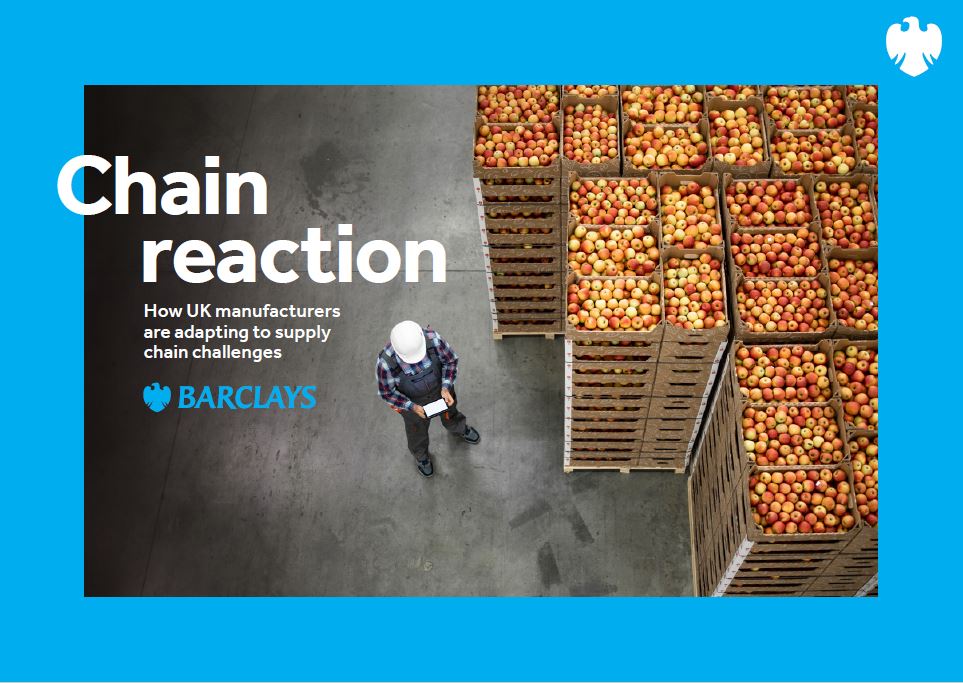- Goods with a total value of over £1.2bn are currently awaiting completion in Northern Ireland manufacturers’ warehouses as key parts, ingredients and materials are delayed due to supply chain issues
- £9bn of steel and metals products, £3bn of food and drink, £2.6bn of plastic goods and £2bn of electronics across the UK are unfinished because of supply logjams
- With more than six in ten businesses facing supply chain difficulties, manufacturers are investing in more storage space and moving suppliers closer to home to ease challenges
A new report1 released today by Barclays Corporate Banking reveals that goods with a total value of over £1.2bn are awaiting completion in Northern Ireland manufacturers’ warehouses because of supply chain delays.
The study – ‘Chain reaction’ – focuses on manufacturing businesses with over ten employees and looks at the impact of supply chain issues. Barclays’ research shows that over nine in ten (90%) Northern Ireland businesses are currently holding items in their warehouses awaiting completion because raw materials, ingredients or component parts have not yet been delivered from suppliers. On average, this ‘unfinished business’ is worth over £1.2m to each company impacted.
Products in the steel and metals sector are most severely affected, with £9bn worth of goods incomplete – equivalent to almost a fifth (19%) of the sub-sector’s annual turnover across the UK. The most affected consumer goods sector is food and drink, with delays in sourcing ingredients causing a £3bn backlog. A high value of plastic products (£2.6bn) and electronics (£2bn) are also awaiting completion.
The industry is innovating to solve these challenges. Most commonly, Northern Ireland businesses are increasing their storage capacity (52%) to prepare for the fact raw materials are taking longer to source. Meanwhile, nearly four in ten (39%) are “near shoring” to move their supply chains closer to home and 29% have brought elements of their supply chain in house. To spread their bets, 32% of manufacturers have increased the number of different suppliers they work with.
To maintain cashflow and liquidity, over half (52%) of Northern Ireland manufacturing firms are optimising their working capital cycles and more than four in ten (44%) are accessing additional bank funding. 38% are seeking a cash injection from private equity and more than a quarter (28%) are turning to shareholder loans to raise funds.
Such measures are leaving the industry confident in the medium-term. Nearly six in ten (58%) Northern Ireland companies think supply chain challenges will improve over the next six months and 80% are confident about growth next year.
Businesses have also doubled down on their commitment to sustainability despite supply chain pressures. Two thirds (66%) of UK manufacturers say carbon reduction has become an even bigger priority in the past six months, despite seven in ten (70%) saying their environmental goals have become less attainable.
Amidst the business optimism, however, Barclays’ report also lays bare the threat that rising costs and supply chain disruption could pose long-term if circumstances do not improve. On average, Northern Ireland manufacturers only expect to be able to sustain their operations for a further 16 months if current conditions continue.
John Mathers, Corporate Development Director at Barclays Corporate Banking in Northern Ireland, said: “The Northern Ireland manufacturing sector has faced a perfect storm of challenges this year, with rising costs, the war in Ukraine, labour shortages and ongoing Covid lockdowns in China hitting supply chains hard. As a result, over £1,2bn worth of goods are trapped in warehouses unfinished, and this may hit industry turnover in the early part of next year.
“However, manufacturing firms have done what they do best and engineered new solutions to limit the impact of the issues they face. As a result, many businesses will enter the new year with a degree of cautious optimism and confidence. Our survey highlights the continuing resilience of the sector in Northern Ireland with over 80% of companies feeling confident about growth next year.”
Other findings from the ‘Chain Reaction’ report include:
- 64% of UK manufacturers have faced rising costs because of the recent weakness of the pound
- Trade barriers are a concern for almost one in three manufacturers across the UK. They are a particular issue for the electronics industry (43%) and the automobile industry (41%)
- The top interventions that manufacturing firms would like to see from government are industrial energy transformation (37%) and a more aggressive energy price cap for the industry (32%)


